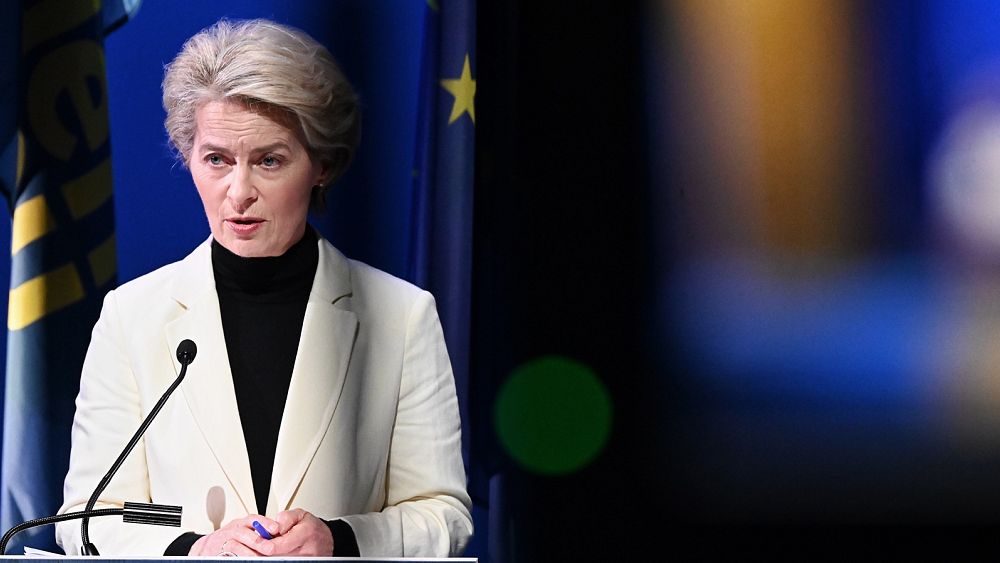
The European Union wants to compete with the United States on «quality, not subsidies,» Ursula von der Leyen has warned as the administration of US President Joe Biden begins to roll out a massive programme of tax credits and direct rebates for green technology under the so-called Inflation Reduction Act (IRA).
The IRA will dole out up to $369 billion over the next ten years for American companies and consumers who wish to produce, invest and buy things like solar panels, wind turbines, electric vehicles, batteries and electrolysers to generate low-emission hydrogen.
Crucially, the subsidies will apply only if the products are mostly processed and manufactured in North America, a provision the EU considers discriminatory and unfair.
«It is great that our American friends are now heavily investing in their climate agenda. We started earlier,» Ursula von der Leyen said on Friday during an official visit to Sweden.
But, she added, «there are some parts in the IRA that have a negative impact on the level playing field between us and the United States.»
Fears are growing that European companies will gradually move their operations to America in order to profit from the IRA’s tax credits and leave the continent’s manufacturing sector in tatters.
Speaking on Friday, the European Commission President promised to deliver «very strong, positive and reassuring» countermeasures to prevent the industrial exodus. This answer would complement an ongoing dialogue between Brussels and Washington aimed to tackle the main points of friction.
«$369 billion is an impressive amount,» von der Leyen admitted.
«What is important for us,» she continued, «is that with the clean-tech sector, and all the innovative power that it has, we have a level playing field. We want to compete on quality, that’s important, we do not want to compete on subsidies, but on quality.»
As a first step, von der Leyen said her services would focus on a two-fold approach: tweaking the EU’s state aid framework and establishing new sources of collective funding.
The changes to state aid rules, which give the Commission the power to block national subsidies that threaten to disrupt fair competition among the 27 member states, will be «targeted» and «temporary,» von der Leyen said.
«But it is not suitable for every member state,» she noted.
Relaxing state aid rules is generally seen as beneficial for larger countries, like Germany and France, that have the financial power to inject generous subsidies into their national industries but as potentially detrimental for smaller and poorer states that might be left defenceless against this sudden economic boost.
«Therefore, it’s so important to have, besides the state aid that should be used, also a funding tool or funding tools that we will develop (and) give an answer to the need of investment in tech, mostly in common European projects and common European interests in the green transition,» von der Leyen said.
The Commission chief said this new funding should be «available in the short term and in the mid-term» but did not give more details on its size or its origin, as the EU’s seven-year budget is already agreed upon and has barely any room left to accommodate fresh expenses.
The idea of issuing new common EU debt, as was the case for the €750-billion coronavirus recovery fund, has gained traction in recent weeks, but frugal countries remain opposed.
However, the IRA’s entry into force and its evident results – including an announcement by the Korean company Hanwha Qcellsa to spend $2.5 billion on manufacturing solar panels in Georgia – has drastically increased the sense of urgency across the bloc.
Earlier this week, Belgian Prime Minister Alexander De Croo accused the US of courting European companies «in a very aggressive way» and telling them «don’t invest in Europe, we have something better.»
De Croo claimed Belgian chemical and steel companies had been approached by America but said he did not know if the lobbying had been undertaken by public authorities or the private sector.
«You could say it’s fair game, but then you (the US) shouldn’t say: ‘Oh, we forgot about the impact on Europe’,» the Belgian leader told the Financial Times.
«I think they were very well aware of the impact that it would have.»
Asked about De Croo’s incendiary comments, von der Leyen refused to say if she had received any reports of American companies wooing their European rivals.
«For us, it’s very important to be fast,» the Commission chief said.
«Investment decisions are being taken now. We need the green transition. We need the green-tech sector now. We are leading, we are the pioneers of that, but we want to keep the industry here and we want to support the industry here.»
